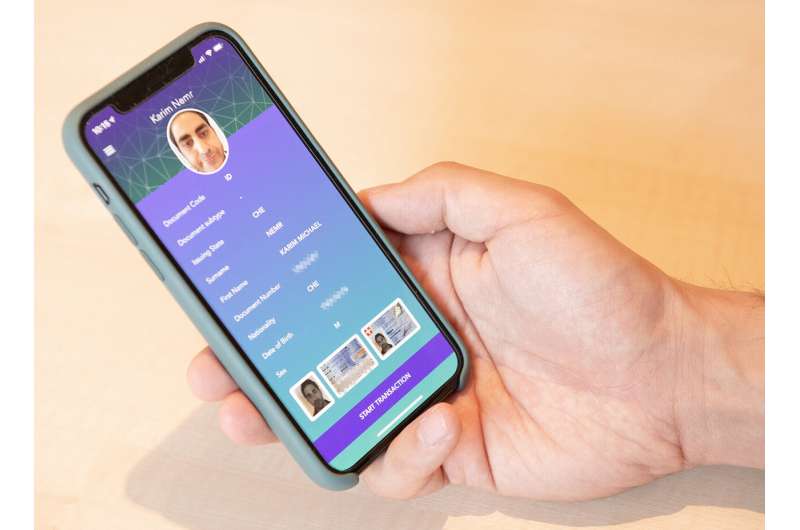With the help of the app, the verification of a person's identity becomes almost child's play. Credit: ETH Zurich
Anyone who wants to open a bank account or buy a mobile phone plan has to identify themselves to the respective service provider. The ETH spin-off PXL Vision has a simpler solution: just use an ID scan and a selfie video. Several companies are already using the new technology.
"We bring trust to the digital world by enabling secure digital identity verification." This is how 34-year-old Karim Nemr summarizes the business concept behind PXL Vision. He is one of the founders of the ETH spin-off, which aims to create products that could one day be as ubiquitous in our day-to-day lives as coffee machines or smartphones.
Actually, the latter is vital to the business idea of these young Zurich entrepreneurs: in PXL Vision's technology, the smartphone replaces the people who currently verify the identity of potential customers in a bank branch or a mobile phone operator's shop.
The process is simple, as Nemr demonstrates: First he scans the front and back of his ID card, and then he records a short selfie video. Using an app, the documents are uploaded to a cloud on a certified Swiss server. Within seconds, the system confirms whether the scanned document and the video are authentic, if a real person is in front of the camera and if the identity document matches the person. With this fully automated method, customers can immediately purchase a mobile phone subscription or set up a bank account from anywhere and at anytime. They are no longer dependent on a customer advisor or opening hours.
The technology, called Daego (a mash-up of "digital alter ego"), supports all international travel documents as well as other forms of ID—for example, the voter card that serves as the primary ID in Mexico.
There are other potential applications in the private sphere, for instance when employing a babysitter, hiring a private tutor, for online-gambling or even online-dating. With the PXL Vision app, people could quickly check to see if the person at the door is indeed the person who applied for the post.
New process is more secure
Current solutions for verifying someone's identity still require some human interaction with another person somewhere in the process. "With other commercially available solutions, the verification often takes place via video chat with an employee or even offline in India, but it's still a human interaction," Nemr says, continuing: "This is not only laborious and expensive, but poses a major risk to users' privacy." PXL Vision's automated solution, he argues, is faster, more precise, more affordable, and more secure than having people do the verification.
Customers are of the same opinion: telecommunications provider Sunrise was one of the first to sign up, despite initial skepticism. "At first, the company's main concern was whether their customers would accept the new technology," Nemr explains, "but these were unfounded. It turns out that, regardless of age or gender, people have no problem with their identity being verified digitally."
Swiss Sign, provider of the digital SwissID, has proven to be another key partner for PXL Vision. And the rest of the customer list—which includes UPC as well as other mobile phone operators and banks—reads like a Who's Who of Switzerland's digital pioneers. Nemr is also proud of his company's financial independence: "We've been self-supporting since day one and we've managed to grow without accepting external financing."
ETH's good image
Nemr never imagined that he would wind up in this field after studying hospitality management in Lausanne. "I was always interested in technology already as a child, and knew early on that I wanted to be an Entrepreneur" he recalls.
After completing his degree, he signed on as the first business employee of ETH spin-off Dacuda, which caused a sensation with its scanner mouse. At the start of 2017, Dacuda sold its 3-D business to US company Magic Leap. Several employees stayed under the new ownership; Dacuda's original founder, Michael Born, worked with three other key people, including Nemr, to help launch the new entity.
PXL Vision has had a close relationship with ETH Zurich for many years. "Without ETH, we wouldn't be where we are today," Nemr says. He adds that Elgar Fleisch's institute played a major role in Dacuda's success. Later, PXL Vision reaped the benefits of the Dacuda team's expertise.
The young company continues to work closely with the image processing team headed by ETH professor Luc van Gool. And bearing the label of "ETH spin-off" helps with credibility. "ETH stands for quality and hi-tech. And it produces the best people," Nemr says, smiling as he adds, "Still, in trying to recruit this talent, we're competing against companies like Google, Apple, Facebook and Disney."
Banks, the US and Asia
Even without ETH experts on board, PXL Vision occupies a prime position. It is headquartered in Zurich and operates development centers in Armenia and Serbia. This past May, the company won the Swiss Economic Award, and in various start-up competitions, Nemr and his colleagues are usually far out in front.
No wonder, then, that he looks to the future with optimism. The next step is to establish the company in the financial industry, and gain a foothold in the US, Asia and ultimately around the world. Nemr points out that the US and Asian markets in particular are enormous and bursting with potential. "Every year, billions of personal data records are stolen and misused," he says, "which means lack of trust is a huge problem. We have a solution for that."
Provided by ETH Zurich























